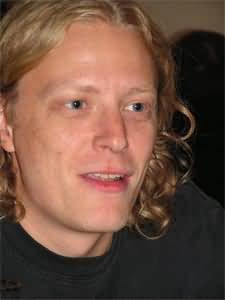


|
Matt Schofield: Da es für die erste CD keine Proben oder Planungen gab, ist sie wie sie ist.
|
||
|
RockTimes: Zunächst herzlichen Dank dafür, dass du dir Zeit für dieses Interview nimmst, Matt.
Matt: Kein Problem. RockTimes: Wie entstand der Kontakt zwischen dir und Gregor Hilden für Greg's Bluesnight?
Matt: Wir stehen schon seit einigen Jahren in E-Mail-Kontakt, weil ich seine Musik mag. Er hat meine CDs und ich habe einige von seinen. Er spielte bereits mit Leuten aus England, mit denen ich auch schon gespielt habe. Also fragte er mich, mit ihm zu spielen und jetzt bin ich hier. 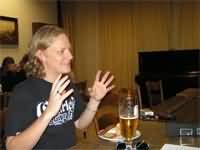 RockTimes: Welche Erfahrungen hast du bisher gemacht und worin besteht der Reiz für dich, bei Greg's Bluesnight zu spielen?
RockTimes: Welche Erfahrungen hast du bisher gemacht und worin besteht der Reiz für dich, bei Greg's Bluesnight zu spielen?Matt: Es ist einfach nur jede Menge Spaß für mich, weil es anders ist, als mit meiner Band zu spielen. Klar, es ist eine größere Band, denn meine Band ist nur ein Trio. Folglich ist es schön für mich, einige andere Songs von meinen Alben zu spielen, die ich mit dem Trio nicht präsentieren kann. Es gibt da schon einige Songs, bei denen es schwierig für uns ist sie live zu spielen, weil ein Trio dafür nicht genügend Hände hat. An und für sich spielt die Band die Parts, die man im Studio overdubben würde. Also ist es großartig, weil ich die Gelegenheit habe, einige dieser Lieder zu spielen. Außerdem ist es schön mit sehr guten Musikern zusammen zu spielen und es ist schön für mich, mit Gregor zu jammen. Er ist ein großartiger Gitarrist und hat tolle Ideen. Es macht Spaß und es ist eine herrliche Abwechslung. RockTimes: Lass uns über deine neue CD Ear To The Ground reden. Wo wurde die CD aufgenommen und wie lange ward ihr im Studio?
Matt: Aufgenommen wurde die CD im holländischen Wijchen, in der Nähe von Nijmegen in den New Road Studios. Dort habe ich schon einige Male mit Big Pete und den Backbones gearbeitet. Ich mag das Studio und den Techniker. Rob ist ein exzellenter Techniker. Alles hat hervorragend funktioniert und ich mag die Gegend. Tatsächlich spielen wir viel in Holland und auch einige Sachen mit Pete. Es ist so etwas wie eine zweite Heimat. Insgesamt waren wir zirka 10 Tage dort. Drei oder vier Tage spielten wir mit der Band und an den anderen Tagen nahmen wir den Gesang auf und machten das Overdubbing. Dann ging es zurück nach England und einige Wochen später war das Mixen dran. Ja, zusammen waren es einige Wochen für die gesamte CD. RockTimes: Jedem Song nur zwei Takes zu geben, um auf das Album zu kommen, ist schon ein ungewöhnlicher Weg für die Auswahl von Liedern. Welchen Grund gab es dafür?
Matt: Vielleicht. So ist es, oder man kann es aus meiner Sicht vergessen. Hop oder Top. So spielen wir und so klingen wir. Oder ich bleibe für drei Jahre im Studio, denn ich bin auch ein Perfektionist. Aber ich habe nicht das Geld oder die Zeit dafür. Wenn ich keine drei Monate im Studio sein kann, muss ich wenigstens drei Minuten dort sein. Nur so geht es. RockTimes: Das bedeutet aber auch, dass Jonny und Evan die Songs kennen müssen.
Matt: Zwei Tage haben wir geprobt, oder ich sollte besser zwei Nachmittage sagen. Außerdem spielten wir einige Stücke schon vorher. Wir spielen schon so viel zusammen und darüber hinaus ich bin mit Jonny zur Schule gegangen. Wir kennen uns seit dem wir 12 oder 13 Jahre alt waren. Wir müssen nicht wirklich Dinge durchgehen oder besprechen. Ich gebe ihm einen groben Abriss eines neuen Songs und ab geht es. 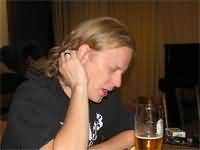 Ich muss immer an unsere erste CD denken, denn das Live-Album, welches wir veröffentlichten, war zunächst nicht so geplant. Es war einfach da, um mehr Gigs zu bekommen. Keine großen Pläne steckten dahinter. Wir haben den Gig aufgenommen, um zu schauen, ob wir an mehr Auftritte kommen. Schließlich haben wir das Album veröffentlicht und die Leute mögen die Platte immer noch. Sie ist vielleicht nicht perfekt, aber die Stimmung und die Energie stimmen. Daran versuche ich mich immer zu erinnern und an dieser Idee dran zu bleiben. Da es für die erste CD keine Proben oder Planungen gab, ist sie wie sie ist. Wir versuchen, dass auch für unsere Studio-Platten aufrecht zuhalten. Kein ständiges polieren an den Aufnahmen, sodass diese erste Energie erhalten bleibt. Ich muss immer an unsere erste CD denken, denn das Live-Album, welches wir veröffentlichten, war zunächst nicht so geplant. Es war einfach da, um mehr Gigs zu bekommen. Keine großen Pläne steckten dahinter. Wir haben den Gig aufgenommen, um zu schauen, ob wir an mehr Auftritte kommen. Schließlich haben wir das Album veröffentlicht und die Leute mögen die Platte immer noch. Sie ist vielleicht nicht perfekt, aber die Stimmung und die Energie stimmen. Daran versuche ich mich immer zu erinnern und an dieser Idee dran zu bleiben. Da es für die erste CD keine Proben oder Planungen gab, ist sie wie sie ist. Wir versuchen, dass auch für unsere Studio-Platten aufrecht zuhalten. Kein ständiges polieren an den Aufnahmen, sodass diese erste Energie erhalten bleibt.Einige der Tracks waren die ersten Takes, die auf dem Album landeten. Wir haben einige Songs öfter gespielt, aber benutzten dennoch den ersten oder zweiten Take. Vielleicht gab es ein Lied, das wir drei Mal gespielt haben, aber nicht am selben Tag. Ich meine, wir haben den Song dann direkt als erstes am nächsten Morgen gespielt. RockTimes: Aus meiner Sicht ist der Slow-Blues "Once In A While" ein echtes Highlight auf dem Album. Kannst du etwas darüber erzählen?
Matt: Zunächst einmal muss ich sagen, dass ich es liebe, Slow-Blues zu spielen. Es sind meine Favoriten. Also versuchte ich einen anderen Weg für einen Slow-Blues zu finden. Der Song beinhaltet einige Extras und andere Dinge. Meine Freundin hatte einige Texte, die sie geschrieben hat. Im Original ist es eine wahre Geschichte, nicht eine Mann-Frau-Beziehung, sondern eine Familiengeschichte. Aber wie das oft so ist mit Texten: Sie entwickeln sich in eine eigene Richtung, weg vom Original und so wurde es doch zu einem normalen Blues mit der Sache über Mann und Frau und es ging auch so. Sie hatte diese Idee und ich habe sie in den Song eingearbeitet. Es war geplant einen Ray Charles-Blues zu verwirklichen, so wie er einen Slow-Blues spielen würde. Nicht die üblich Art eines Albert Collins oder B.B. King Slow-Blues. Ich habe versucht, in solchen Strukturen zu denken. Man kann wirklich die Intensität in einem Slow-Blues aufbauen, in dem man weniger spielt. Es ist wie an den Zügeln eines Pferdes zu ziehen. Das war die Idee für dieses Lied und ich mag es, solche Sachen zu spielen. RockTimes: In "Someone" spielt Pete van der Pluym (Big Pete) seine Harp. Gibt es eine besondere Beziehung zu ihm?
Matt: Absolut! Big Pete ist mein Blues-Bruder. Er ist der Bruder, den ich nicht habe. Wir haben den gleichen musikalischen Ursprung, obwohl wir manchmal unterschiedliche Wege gegangen sind. Wir sind fast ein Alter und als wir uns das erste Mal trafen, dachte ich: Wer ist denn der Typ? Folglich wollte ich ihn auf dem Album haben und die Gelegenheit war ja auch günstig. Und ich kann ihn ins Gespräch bringen, denn wir werden in Amerika oft ihm Radio gespielt. Ich möchte, dass die Leute Pete hören. Ich genieße es, mit ihm zu spielen. RockTimes: Letztes Jahr hast du ein Konzert mit Robben Ford gespielt. Das muss eine besondere Erfahrung für dich gewesen sein.
Matt: Wir erhalten viele gute Reviews über unsere Platten und Gigs. Das ist großartig. Die Unterstützung der Press und der Blues-Fans ist toll. Aber für mich als Musiker gibt es nichts besseres, als aus seinem Munde zu hören: »Ich habe deine CD gehört. Sie hat mir echt gefallen. Tatsächlich halte ich soviel von dir, dass ich dich bitten möchte, mit mir zu spielen.« Das bedeutete mir mehr als alles andere, denn er ist jemand, von dem ich gelernt habe und den ich als Musiker seit meiner Kindheit respektiere. Es ist, als wenn man einen großen Daumen hoch zeigt. Das Siegel der Anerkennung. Es bedeutet mir wirklich viel und er war auch sehr nett zu mir. Tatsächlich habe ich ihn letztes Wochenende wieder gesehen, aber wir haben nicht zusammen gespielt. So etwas ist das beste Kompliment, das man bekommen kann. Hoffentlich können wir nochmals zusammen spielen. So nervös, wie bei diesem Auftritt war ich schon lange nicht mehr. Es war toll und wir hatten eine schöne Zeit. RockTimes: Wie man auf deinen CDs hören kann, tendierst du immer wieder zur jazzigen Seite der Musik. Wo ist deiner Meinung nach die Schnittmenge zwischen Blues und Jazz, wenn es zugegebenermaßen überhaupt eine gibt?
Matt: Ehrlich gesagt, es ist alles das Gleiche für mich. Ich mag alles, von Lightnin' Hopkins über Jimi Hendrix über ZZ Top über Miles Davis bis hin zu Oscar Peterson, Tower Of Power, The Meters, James Brown und B.B. King. Für mich ist das alles das Gleiche. RockTimes: Einfach nur Musik?
Matt: Genau! Einfach nur Musik. Und ich wollte wirklich auch immer nur ein Musiker sein. Alles, was ich mag, kommt vom Blues. Sogar der Jazz kommt vom Blues und ich mag die bluesige Art des Jazz. Ich möchte der beste Musiker sein, im Gegensatz zum besten Gitarristen. Das schließt alles ein. Was ist Jazz, Blues, Funk, Soul oder Rock? Wenn ein Feeling rüber kommt, ist es gut für mich. Das ist die Hauptsache. Das Schlimmste, was dir als Musiker passieren kann, ist kategorisiert zu werden. Ich hasse Kategorien und Vergleiche. Aber wenn Leute beides brauchen, um anderen eine Idee von der Musik zu geben, habe ich Verständnis dafür. Es muss halt sein. 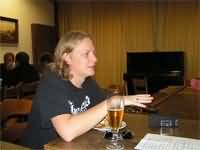 RockTimes: Ohne uns etwas über deine Karriere vor dem Matt Schofield Trio, das 2003 gegründet wurde, zu erzählen, lasse ich dich nicht gehen. RockTimes: Ohne uns etwas über deine Karriere vor dem Matt Schofield Trio, das 2003 gegründet wurde, zu erzählen, lasse ich dich nicht gehen.Matt: Ich war für längere Zeit in vielen Bands. Zuerst bei Lee Sankey, einem Harp-Spieler aus London. Na ja, das war, als ich die Schule verlassen hatte. Ich war 13, als ich meinen ersten Gig spielte. Mit Jonny spielte ich mit 15 oder 16 Jahren und er war damals 13 oder 14. Wir haben so ziemlich das Gleiche gespielt, wie jetzt, vielleicht nicht ganz so gut, aber nicht schlecht und wir spielten lokale Konzerte. Dann war ich einige Zeit in Amerika, weil mein Vater dort seit 20 Jahren lebt. Dort habe ich viele Gigs besucht. In London ging ich zu einer Jam-Session im Weavers, den es leider nicht mehr gibt. An diesem einen Abend habe ich so ziemlich alle Musiker getroffen, mit denen ich bis jetzt zusammen gespielt habe. Ich traf dort Lee, Ian Siegal, Earl Green und Todd Sharpville. Auch habe ich mit einigen Rhythmusgruppen in verschiedenen Bands gespielt. Es war damals wirklich eine spezielle Jam in London. Durch Todd, der diese Jam veranstaltete, traf ich auf Dino Bapiste, der Keyboarder in Dana Gillespies Band war. So spielte ich auch in Dinos und Danas Band. Und ich traf Evan, meinen jetzigen Drummer. Er spielte einen Gig mit Dino und als ich zuhause war, sagte ich zu Jonnys Bruder James: »Ich glaube, ich habe den Drummer, mit dem ich spielen möchte, gefunden.« Dabei war er Ersatz für einen anderen Schlagzeuger. 5 Jahre später war er in meiner Band. Für gute 5 oder 6 Jahre habe ich alles Mögliche gemacht. Durch Lee waren wir auf Tour in Holland und ich traf Mike Donkers von Mike & The Mellotones. Außerdem lernte ich Julius kennen und dann fragte mich Mike, ob ich die erste Tour der Lester Butler Tribute Band mitmachen würde. Dann traf ich Pete und er stellte mich Joost Tazelaar vor, der Drummer bei Drippin' Honey war. Gemeinsam hatten wir eine kleine Band. Enrico Crivellaro war auch in der Lester Butler Tribute Band. Er spielte mit einem Freund in Toronto, der wiederum ein Freund meiner Freundin war. Sie arbeitet in London. Da sie Kanadierin ist, war ich auch einige Zeit in Kanada. Im Moment ist sie dort und wir spielen dieses Jahr auf dem Montreal Jazz Festival. Also haben wir auch dort mehr Auftritte. Tatsächlich ist Greg's Bluesnight eine Sache, die in keiner direkten Beziehung dazu steht. Er spielte mit Dana Gillespie und Earl Green, die ich aus London kenne. Hauptsächlich ging es von einer Person zur nächsten. Schon komisch, wenn man es sich aus dieser Richtung betrachtet. RockTimes: Nachträglich herzlichen Glückwunsch zum Geburtstag, Matt! Wie war deine Geburtstagsfeier im Londoner 100 Club?
Matt: Ja, das war letzte Woche. Wir spielten im 100 Club, wo wir den Gig gefilmt und aufgenommen haben. Mal gucken, was daraus geworden ist. Ich habe noch nichts gesehen, aber vielleicht machen wir eine DVD daraus. Wir hatten 'ne Menge Spaß. Ian Siegal war da, Big Pete und Julius kamen aus Holland rüber. Das war großartig. Sie waren bisher noch nicht zum Spielen in London. Es war toll. RockTimes: Vergleicht man die Live-Platten mit den Studio-Alben ist festzustellen, dass Jonny Henderson, Evan Jenkins und du es mögen, in die Songs lange Improvisationen einzuflechten und es einfach groovig dahin fließen zu lassen. Ist das ein Markenzeichen des Trios?
Matt: Ja, natürlich und es ist immer anders. Wenn wir eine Studio-CD machen, bin ich immer sehr bewusst. Nicht jeder mag ein fünfminütiges Gitarrensolo. Also versucht man den Reiz einer Studio-Platte zu erweitern und geschmackvoll zu sein. Die Sache mit den Live-Platten, auch Live At The Jazz Cafe, ist die, dass sie nie mit dem Gedanken an Veröffentlichung aufgenommen wurden. Alles, was wir darauf machen, ist für den Moment und für das Publikum zu spielen. Und wenn die eine schöne Zeit haben, kann es sein, dass du über eine Melodie 10 Minuten spielst, wenn das Feeling richtig ist. Bis jetzt waren die Live-CDs nur Nebenprodukte von Konzerten. Also, wenn wir ins Studio gehen, bin ich sehr bewusst. Auf der neuen Platte wollte ich einige dieser Überlängen rauslassen. Es ist außerordentlich wichtig, hier Songs zu haben. Ich mag kein Gitarrenspiel nur um des Spielens Willen. RockTimes: Du hast schon auf Festivals in Kanada gespielt. Wann wird der Punkt gekommen sein, an dem wir Termine in Amerika in deinem Kalender sehen?
Matt: Das ist eine Frage! Kanada war toll mit seinen drei Festivals. Es ist ein riesiger Aufwand, um in Amerika spielen zu können. Du brauchst Visa und eine Arbeitserlaubnis und alle möglichen anderen Sachen. Es hat nichts damit zutun, dass wir nicht wollen und die ganze Sache ist es auch nicht wert, illegal dort zu spielen, ohne ein gültiges Visum. Du wirst überrascht sein, wie schwierig es heutzutage ist, in Amerika zu spielen, obwohl mein Vater in Amerika lebt. Ich arbeite daran, ein Visum zu bekommen und dann kann ich ohne Probleme dort spielen. 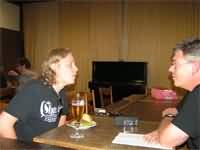 Wir werden dort so oft im Radio gespielt. Es ist frustrierend, weil man diese Radio-Einsätze unterstützen möchte. Man möchte, dass der Moderator sagen kann: »Das war das Matt Schofield Trio und die kann man am Freitagabend in der oder der Bar sehen.«. Hoffentlich sind wir nächstes Jahr soweit. Wir hätten schon letztes Jahr dort spielen können, aber die Visa lagen nicht vor. Wir werden dort so oft im Radio gespielt. Es ist frustrierend, weil man diese Radio-Einsätze unterstützen möchte. Man möchte, dass der Moderator sagen kann: »Das war das Matt Schofield Trio und die kann man am Freitagabend in der oder der Bar sehen.«. Hoffentlich sind wir nächstes Jahr soweit. Wir hätten schon letztes Jahr dort spielen können, aber die Visa lagen nicht vor.Bei dem momentanen Weltklima, in der heutigen Situation der Welt, ist es sehr schwierig, nach Amerika zu kommen. RockTimes: Gibt es etwas, was du deinen deutschen Fans sagen möchtest?
Matt: Ich hoffe wirklich, mit meiner Band rüber zu kommen und für alle zu spielen. Es macht viel Spaß hier mit den Jungs. Aber offensichtlich wäre es schön, wenn ich Konzerte mit meinem Trio geben könnte, sodass jeder weiß, was es damit auf sich hat. Vielleicht gibt es einen Agenten, der uns eine schöne Tour zusammenstellt, denn darauf läuft es hinaus. Hier in Deutschland gibt es anscheinend viele großartige Konzerte. Riesig habe ich mich über die große Zahl von Leuten gefreut, die an den letzten Abenden speziell hierfür gekommen sind. Grundsätzlich hoffe ich, öfter hier zu sein. Es scheint der beste Platz für Live-Musik zu sein, der in der Nähe der UK ist. Im Moment ist es dort nicht so gut. Folglich beginnst du danach zu gucken, wo Leute noch an deiner Musik interessiert sind. Deutschland entwickelt sich für uns zu einem der größten Orte, den wir besuchen möchten. Wir versuchen, hier so oft wie möglich zu sein. RockTimes: Vielen Dank, Matt.
Matt: Vielen Dank, Kumpel. Prost! RockTimes welcomes our foreign guests
RockTimes: First of all, thank you very much, Matt for taking your time fort his interview.
Matt: No problem. RockTimes:How did Gregor Hilden and you get in contact for Greg's Bluesnight?
Matt: Well, we'd spoken on e-mail over the last few years because we like each others playing. He's got my CDs and I've got some of his stuff. He played with people I played with from England. So he asked me to come and play and so I did. RockTimes: What is your experience so far after two shows and what is the excitement playing with Greg's Bluesnight?
Matt: It's just a lot of fun for me because it's different form my own band. Obviously it's a much bigger band, my band is just the organ trio. So it's nice for me to do some different songs of the couple of my records that I haven't been able to do with just the trio. There are a couple of songs that are pretty difficult for us to do live because the trio doesn't have enough hands. The band is actually doing the parts where in the studio you might overdub a certain thing. So this is great. It allows me the chance to play some of those songs. It's also nice to play with very good musicians. It's nice for me to jam with Gregor. He's a great guitarist and he can bounce ideas of each other. It' just fun. It makes a nice change. 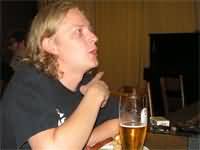 RockTimes: Let's talk about your latest CD Ear To The Ground. Where is CD recorded and how long did you stay in the studio? RockTimes: Let's talk about your latest CD Ear To The Ground. Where is CD recorded and how long did you stay in the studio?Matt: It was recorded in Holland actually. In Wijchen near Nijmwegen in New Road Studios there. I worked there lots of times with Big Pete and The Backbones. So I liked the studio and the engineer. Rob is an excellent engineer. So it worked out very well. I just like the environment. We play a lot in Holland actually with the trio and the odd things with Pete. It's a kind of our second home. We had about 10 days altogether. Three or four days with the band playing and a couple of days singing and overdubbing. Then we went back and mixed it a couple of weeks later. Yeah, a couple of weeks altogether to do the hole thing. RockTimes: Giving each song only two takes to appear on the album is a quite unusual way to select songs. What was the reason for that?
Matt: Maybe. It's that or spent forever for me. It's one or the other. This is how we play and sound like. Or I'd be there for three years because I'm a perfectionist as well. But I don' have the budget or the money or the time to do that. If I can't spend three month then I got to spend three minutes. It's the only way to go. RockTimes: That means Jonny and Evan must know the songs. Matt: We did two days rehearsal or two afternoons should I say. And we played some of the songs already beforehand. We play together so much and I went to school with Jonny. We know each other since we were 12 or 13. We don't really have to look things through or discuss them. So I just give him a rough outline of the new song and off we go. I always think that our first CD, the live-album that we put out when it even wasn't got to be an album. It was just something to get more gigs. No great plan behind it. It was just like let's record a gig and see if we can get some more gigs. We ended up in releasing it and people still like that record. It might not be perfect but there's a good vibe and energy in it. I always try and keep that in mind and keep the idea. There were no rehearsals and no planning at all. It's just what it is. We try to keep that even when we do a studio record. No polishing over and over again. Keep that first energy. Some of the tracks ended up being the very first take on the record. We did some a couple of times but still used the first take or maybe the second one. Maybe there was one we played three times but not on the same day. I think we went back the next day and then played it first thing in the morning. RockTimes: From my point of view the Slow-Blues "Once In A While" is a real highlight on the album. Please tell us about the song.
Matt: First of all I just love playing Slow-Blues. They're one of my favourites to play. So I was going to find a different way first of all of doing a Slow-Blues. It's got some extra changes in it and things like that.  Then my girlfriend had some lyrics that she'd written. Originally a true story not a male female relationship but a family relationship. But as it often happens with lyrics they develop in their own direction away from the original and so it kind of became the usual Blues man-loves-woman type of thing which seems to work. She had this idea and the lyrics and I made it into a song. Then my girlfriend had some lyrics that she'd written. Originally a true story not a male female relationship but a family relationship. But as it often happens with lyrics they develop in their own direction away from the original and so it kind of became the usual Blues man-loves-woman type of thing which seems to work. She had this idea and the lyrics and I made it into a song.It was the intended idea to bring in that Ray Charles-Blues, the way he would do a Slow-Blues. Not just the usual kind of Albert Collins, B.B. King Slow-Blues. I was thinking in terms of that. You can really build the intensity of a Slow-Blues by actually playing less. The more it builds the less notes you play. It's like pulling on the reins of the horse. That was the idea of that one. I like to play that kind of stuff. RockTimes: "Someone" features Pete van der Pluym (Big Pete) on harp. Is there's a special relationship to him?
Matt: Absolutely. Pete is my Blues brother. He's the brother I don't have. We come from the same place although we've taken different paths sometimes. We are almost the same age. The first time I met him I just thought who is this guy? So I wanted to get him on the CD and it was a good opportunity, too. And I can spread the word about him around the place a bit because we're getting nice air-play in America. So I want people to hear Pete. I always enjoy playing with him. RockTimes: Last year you sat in for a show with Robben Ford. That must have been a special experience?
Matt: We get lots of nice reviews for the records and gigs which is great. The support has been great from the press and Blues-fans. But for me as a musician there was nothing better than having him say: »I heard your CD. I really liked it. In fact I think enough of your playing to ask up to play with me.« That meant more to me than anything because it's somebody I've learned from and respect him as a musician since I was a kid. It's like a big thumbs up. The seal of approval. It really meant a lot and he was very kind to me. I saw him again last weekend actually but we didn't have a chance to play together. It's the best kind of compliment. Hopefully we get to do it again sometime. Probably the most nervous I've got for a long time. It was great and we had a good time. RockTimes: As to be heard on you records you also tend to jazzy side of music. Where is the intersection between Blues and Jazz in your opinion? If there is one to admit.
Matt: It's really all the same to me to be honest. I like everything from Lightnin' Hopkins to Jimi Hendrix to ZZ Top to Miles Davis, Oscar Peterson, Tower Of Power, The Meters, James Brown and B.B. King. It's all the same to me. RockTimes: Just music.
Matt: Exactly. It's just music. And I always wanted to be just a musician, really. Everything that I like comes from the Blues. Even Jazz comes from the Blues. And it's the bluesier kind of Jazz that I like. I just want to be the best musician apposed to the best guitarist. So that includes everything. And especially these days I really think about songs and singing and other things. What is Jazz, Blues, Funk, Soul or Rock? If it feels good then it is good to me. That's all that matters. The worst thing you can have as a musician is the categories. I hate categories and comparisons. But if people need to do both those things in order to give other people an idea I understand that. It has to happen. 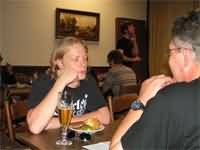 RockTimes: I won't let you go without telling our readers about your career before The Matt Schofield Trio that was founded in 2003. RockTimes: I won't let you go without telling our readers about your career before The Matt Schofield Trio that was founded in 2003.Matt: I was just in a lot of bands for a long time. First of all Lee Sankey, a harmonica player from London. Well this is after I abandoned school. I was 13 when I did my first gig. When I was about 15 or 16 I played with Jonny who was about 13 or 14 at the time. That was at school. We were playing the same stuff we play now really. Maybe not quite as good but it wasn't bad. And we played local gigs. Then I spent quite a time in America because my dad lives there for about 20 years. So I saw a lot of gigs there. In London I went to a jam-session at the Weavers which is gone now. In one night I pretty much met everybody that I would go and play with till now. That night I met Lee, Ian Siegal, Earl Green and Todd Sharpville. Lots of rhythm-sections I went on to play with in various bands. It was a really special jam in London back then. Through Todd who ran the jam I met Dino Baptiste who was the keyboard-player in Dana Gillespie's band. So I ended up in Dino's band and Dana's band. And I met Evan, my drummer now. He did a gig with Dino and I went home that night and said to James, Jonny's brother: »I think I found the drummer I want to play with.« He just was filling in for someone. Sure enough five years later he was in my band. For a good 5 or 6 years I was just doing what ever. And also through Lee we had a tour in Holland and I met Mike Donkers from Mike & The Mellotones. I met Julius and out of that Mike asked me to do The Lester Butler Tribute Band with the first tour. So I met Pete and he introduced me to Joost Tazelaar who played drums with Drippin' Honey. So we had a little band for a while. And then being Enrico Crivellaro with The Lester Butler Tribute Band. He was playing in Toronto with a friend of his. He was a friend of my girlfriend. she was going to work in London. I also spend a lot of time in Canada because she is Canadian. She's back there at the moment. This year we go to play the Monrteal Jazz Festival. So we got more gigs out there. Actually Greg's Bluesnight is one of the few things that isn't directly connected like that. He's played with Dana Gillespie and Earl Green who I know from London. Mostly it's been one person to the next. It's funny when you look at it like that. RockTimes: Happy belated birthday, Matt! What was your birthday celebration like at the 100 Club in London?
Matt: Yeah, last week. We did the 100 Club and filmed and recorded it. So we'll see what we got out of that. I don't know what it looks like yet but maybe a DVD. We just had fun. Ian Siegal came down and Big Pete and Julius came over from Holland. So that was great. They've never been over to London to play. It was good fun. RockTimes: Comparing your live-records with you studio-CDs Jonny Henderson, Evan Jenkins and you like to stretch songs by improvising and just let it flow in a groovy kind of way. Is that a trademark of The Trio?
Matt: Yes, certainly. It's always gonna be different. When we come to make a studio-record I'm always very conscious. Not everybody wants to listen to a 5 minutes guitar-solo. So you try and broaden the appeal making a studio-record and trying to be tasteful. The thing with the live-records even the Jazz Cafe one is that neither of them was recorded with release in mind. All we're doing on those is playing for the moment and for the audience. And if they're having a good time then you might play for 10 minutes on a certain tune if the feeling is right. The live-records so far are just a byproduct of doing the gig. So when we go into the studio I'm conscious a bit. On the new record I wanted to leave some of the extended stretching out to the end of the tracks. It increasingly important to have a song there. I don't like guitar playing just for the sake of guitar-playing. RockTimes: You already played festivals in Canada. When is the point you will have American dates in your schedule?
Matt: That's a question. I mean Canada was great with the three festivals out there. The main thing is that it is really difficult legally and justicly to do it. Visas, work permits and all that kind of things. It's not wanting to do it but it's not worse the risk of doing it illegally like without a correct visa. You'll be amazed how difficult it is to play your guitar in America in these days. Even though my dad is an American citizen. So I'm working on getting a visa and then I can be there without worrying. We're getting so much good air-play out there. It's frustrating. You wanna be over there and back up all that air-play. You want the DJ to be able to say: »That was The Matt Schofield Trio and you'll be able to see them on Friday night at the whatever bar.«. Hopefully next year it's gonna happen. We should have gone last year but the visas didn't come through. In the current world climate, the situation of the world today, America is very tight to get into. RockTimes: Is there something you would like to say to your German fans?
Matt: I really hope to get over with my band to play for everybody. It's great fun to do this with these guys. But obviously it be really good to do gigs with my trio so that everybody can see what's all that about. 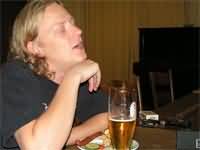 Some agent who wants to book us a nice tour because that is what it comes down to. There seems to be so many great gigs out here in Germany. I've been thrilled about the amount of people that come out specifically to hear this in the last couple of nights. Some agent who wants to book us a nice tour because that is what it comes down to. There seems to be so many great gigs out here in Germany. I've been thrilled about the amount of people that come out specifically to hear this in the last couple of nights.I hope to be here a lot more, basically. It seems like the best place to be for live music that's closest to the UK. It' not so good in the UK at the moment. So you start looking where people might want to hear you. Germany seems like one of the biggest places for us to visit. The plan is to be here as much as we can. RockTimes: Thanks very much, Matt.
Matt: Thanks very much, mate. Cheers. Externe Links:
|
